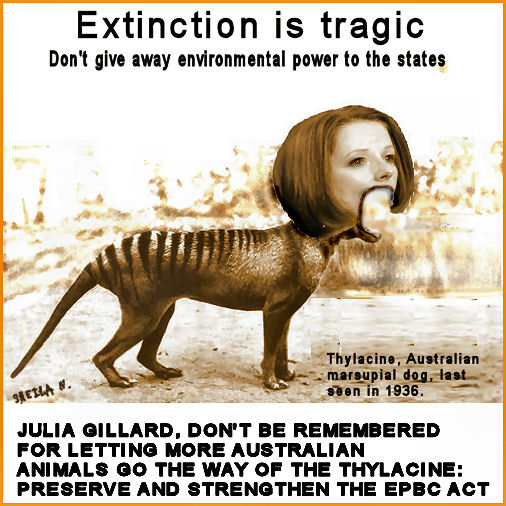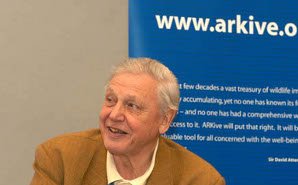International concern at imminent changes to Australia's National Environment law (EPBC Act)
 David Attenborough and other renowned conservation figures have urged PM Gillard to retain National Environment Powers. At the moment changes devolving major decision making to our growth-mad developer states are imminent. The writers of a letter to the Primeminister say that their concern arises particularly due to Australia being "one of a very few biologically mega-diverse developed countries on the face of this Earth. The array of natural ecosystems and their component species is simply breathtaking, making Australia one of the most important and exciting places in the world for the long-term conservation of biological diversity." See also this article which contains links to petitions etc.
David Attenborough and other renowned conservation figures have urged PM Gillard to retain National Environment Powers. At the moment changes devolving major decision making to our growth-mad developer states are imminent. The writers of a letter to the Primeminister say that their concern arises particularly due to Australia being "one of a very few biologically mega-diverse developed countries on the face of this Earth. The array of natural ecosystems and their component species is simply breathtaking, making Australia one of the most important and exciting places in the world for the long-term conservation of biological diversity." See also this article which contains links to petitions etc.
Sir David Attenborough urges Prime Minister not to abandon National Environment Powers

Today, 23 November, 2012, 33 United Nations Environment Program Global 500 Laureates (elected to the UNEP Global 500 Roll of Honour in recognition of outstanding practical achievement in the protection of the environment) delivered Prime Minister Gillard a letter urging her not to abandon national environmental protection and devolve powers to state and territory Governments.
Among the signatories are Sir David Attenborough and five of the world’s most influential conservation biologists: Drs Paul and Anne Ehrlich from Stanford University, Dr Peter Raven, President Emeritus of the Missouri Botanical Gardens, Professor Tom Lovejoy from George Mason University in Washington DC, and Professor Norman Myers from Green College, Oxford University. These are the men and women - the pioneer whistle blowers, who told of the massive loss of species and habitats facing the planet, and of the threat of climate change - going back nearly 40 years.
Also signing on is Veit Koester, who successfully and brilliantly chaired the global negotiations for the Convention on Biological Diversity, the treaty that provided the “head of power” for the Commonwealth’s powerful Environmental Protection and Biodiversity Conservation Act, 1999 (EPBC Act). Joining the 33 signatories is prominent Australian Dr Don McMichael CBE, who chaired the inaugural Federal Biological Diversity Advisory Committee, which prepared the very first draft “National Biological Diversity Conservation Strategy” for Australia.
In their letter the Global 500 Laureates state: “We have been concerned to hear however that there are proposals in train to weaken the EPBC Act and to allow the states and territories to approve developments affecting Matters of National Environment Significance without any Commonwealth oversight. We believe this would be a retrograde step in relation to the development of environmental law in Australia, with significant and negative implications for the conservation of biological diversity and achieving ecologically sustainable development”.
The letter, organised by Humane Society International (HSI) Director and Global 500 Laureate, Verna Simpson, has been presented to the Prime Minister just weeks before the Council of Australian Governments (COAG) meets in early December, to discuss the ongoing administrative process for handing over Commonwealth environmental powers, which has a March 2013 deadline. The Government appears not to be listening to Australia’s professional environmental community, but this letter clearly indicates the global concern for the potential deterioration of effective national environmental regulation in Australia.
The Global 500 Laureates concluded: “The individual and organisational UNEP Global 500 Laureates below would like to offer our support for a continuation of your Government’s efforts to develop best possible policies and practices for the conservation of biological diversity through the maintenance of the current powers contained within the EPBC Act, and to avoid, at all costs, the devolution of such powers”.
You can read the full letter here: Letter entitled, "Strong national environmental protection laws".
See also this article which contains links to petitions etc.
Source
This article was based on a press release from the Humane Society International (HSI).
HSI concentrates on the preservation of endangered animals and ecosystems and works to ensure quality of life for all animals, both domestic and wild. HSI is the largest animal protection not-for-profit organisation in the world, with over 10 million supporters globally and has been established in Australia since 1994.

 John Howard and Kevin Rudd were both advocates for large populations. Because a growing population equates to a growing economy, until you reach the tipping point of no return on environmental/climate change. No politician has the foresight to see this.
John Howard and Kevin Rudd were both advocates for large populations. Because a growing population equates to a growing economy, until you reach the tipping point of no return on environmental/climate change. No politician has the foresight to see this.
Recent comments